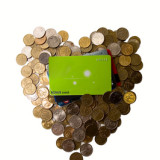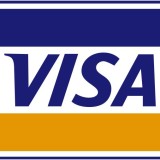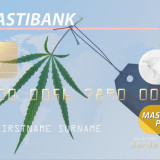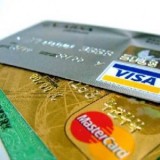This Page is No Longer Being Updated. Please Click Here to search for our current listings of the best prepaid debit cards.
Tag: Visa
-
Charity Prepaid Cards aka NonProfit Affinity Debit Cards – Expert Reviews
Welcome to our site! Our editors have been covering the credit and debit card space for a total of 30+ years and we are proud to have been featured by the Wall Street Journal, CNN, etc. Your input is invaluable and we’d love to have your opinion as to whether a charity debit card that makes automatic donations is a good deal (see below) – this site is powered by you!
Please Note this article was originally published in 2015 and updated in 2018 and is only kept for historical purposes. Please see link below for our current prepaid debit card reviews and other info.
For some, swiping a debit card in a checkout line is more than just a way to pay for something. It’s an act of personal expression and a way to show the world (or at least the cashier) what’s most important to them.
So-called “affinity debit cards” are issued by a company or bank and customized to fit a wide variety of consumer interests. They display logos and pictures of everything from sports teams to teddy bears and are marketed as a way for users to associate with something they care about.
Card.com, a mobile alternative to traditional branch banking, provides thousands of options for consumers interested in affinity prepaid debit cards. Recent additions include Sesame Street, Walking Dead, Garfield, Care Bears, Star Trek and the National Autism Association. Consumers can choose cards they identify with, load money onto the cards, and use them anywhere Visa debit cards are accepted.
New No Fee Visa Card that Can Help you Make More Charity Donations by Saving you Fees:
Chime is a new Visa card that is amazingly free (unless you use the card outside of their large ATM network). This is best alternative to a prepaid card that we’ve seen in 5+ years and offers all of the benefits of traditional bank account.
It’s a real debit card, (not a prepaid debit card which usually have a lot more fees) and people with poor credit can apply too as there is no credit check. Chime can be managed entirely from your smartphone. No overdraft fees. No minimum balance. No monthly service fees. No transfer fees. Over 38,000 fee-free ATMs, plus 30,000+ cash-back locations.
And for a limited time, earn a Cash referral bonus of $50 when you tell your friends and family members about Chime and they sign up (and they’ll earn $50 too)- details within the app after you apply! Click for more info.- you can apply online in just 2 mins with no obligation. Start by simply entering your email address and clicking “Get Started”– over 3 million customers couldn’t be wrong. 🙂 (Ad Link)
“Card.com has figured out a way to make financial services accessible and fun using affinity cards,” said Ben Katz, CEO and co-founder of the website. “Each card becomes a personalized way of banking for our card members.”
Card Benefits for Charities
Many of these affinity cards also reap benefits for charities and nonprofits. For example, Card.com has several autism-related card designs and makes a monthly donation to the National Autism Association for every active card. According to Wendy Fournier with the National Autism Association, these proceeds help provide therapy grants for families,provide safety toolkits for children at risk for wandering, and provide iPads with communication software for minimally verbal individuals.
Another recent nonprofit campaign that joined Card.com was associated with the Paralyzed Veterans of America. The company donated money to benefit paralyzed veterans for every new card sign up during the month of November. They used Popeye, Olive Oyl and Beetle Bailey cards to promote the campaign.
From February 2012 to May 2015, Bank of America is guaranteeing to Susan G. Komen® $1.0 million in conjunction with its Pink Ribbon Banking credit card and checking program (includes a branded debit card). Susan G. Komen has received more than $5.0 million from Bank of America from the credit card and checking account programs since 2009.
Higher Fees and Other Considerations:
A large number of other companies also produce affinity cards, along with many banks, including Arvest and Bank of America. These bank-issued cards, though, are usually tied to a consumer’s bank account, as opposed to the prepaid reloadable products from Card.com. For many, the upside of using prepaid cards is that there is usually no credit check, no overdraft fees and more design options.
However, prepaid cards often have higher fees, including monthly maintenance fees, ATM cash withdrawal and balance inquiry charges, and fees for obtaining paper statements. Card.com charges a monthly maintenance fee of $5.95, but the fee is waived when you load at least $800 onto the card in the prior thirty (30) days via direct deposit.
Linda Sherry, Director of National Priorities for Consumer-Action.org, said that she generally recommends that people use a traditional debit card linked to a bank account. However, she understands there are certain instances and certain people for whom a prepaid card is the best option. Some people, she explained, are locked out of the banking system due to past credit issues.
For them, a prepaid card could be the solution. Others, she said, may consider prepaid cards because they don’t want to travel with cards linked to their bank account or because they want cards they can use to teach their kids good financial habits.
Charity Prepaid Cards aka NonProfit Affinity Debit Cards- Summary
The bottom line, she said, is that people should not be fooled into getting a card “just because it has a puppy on it” (or any other customized design). “That has nothing to do with a card, if a card is good or not,” she said. “If you find [a card] that you’re attracted to, I would look closely at the fee schedule.” She recommended finding a prepaid card that could utilize direct deposit from an employer, which would help avoid large money-loading fees.
Only after closely examining a fee schedule should a consumer decide if the potential drawbacks of an affinity prepaid debit card are worth a nice design or benefits to a favored charity. The upside of using a prepaid card is that you won’t rack up credit card debt while supporting a charity like you can with an affinity credit card program (not surprisingly, credit card programs do tend to give higher rebates to charities than debit card programs). 🙂
Curtis Arnold is a credit expert and co-founder of BestPrepaidDebitCards.com
-
Visa Attacks Prepaid Fee Confusion
It’s getting harder and harder for prepaid card issuers to be sneaky about their fees. Earlier this year the Pew Charitable Trusts issued a report detailing the lack of uniformity when it comes to prepaid fee disclosures and proposed a model disclosure box to make it easy for consumers to compare the fees associated with different products. Soon after that announcement, Chase declared that its Chase Liquid Prepaid Card would adopt Pew’s disclosure suggestions.
On June 3rd, Visa decided to weigh in on the prepaid fee disclosure issue. Working in conjunction with Pew and the Center for Financial Services Innovation, Visa announced that it has developed an easily understandable designation for consumers to look for in order to know quickly whether a prepaid card meets certain standards related to fees, disclosure and benefits. Prepaid card issuers that qualify can include a seal on their packaging and marketing materials that indicate their compliance with certain criteria. Think of it as a prepaid version of the “fair trade” sticker that graces coffee packaging.
“We felt it was important to go beyond current requirements in the marketplace and bring transparency to this growing product area,” says Ryan McInerney, president of Visa Inc. “This Visa designation will signify a new level of simplicity, protection and opportunity, enabling cardholders to confidently manage their spending every day.”
In order to qualify for the Visa designation, prepaid cards must meet a variety of standards such as offering a flat monthly fee that includes all day-to-day uses for the card. In other words, there are a lot of things that prepaid card issuers can’t charge for, such as point of service (POS) cash back, in-network ATM transactions, PIN or signature transaction fees and customer service or overdraft fees.
Additionally, qualifying cards must also offer specific consumer protections. Among other things, to receive a seal of approval cards have to include FDIC insurance, dispute resolution rights and Visa’s zero liability coverage.
According to Pew’s Susan Weinstock, who directs the group’s consumer banking initiatives, Visa’s move is important. “Visa is taking an important step forward by acknowledging the importance of clear disclosures and consumer protections,” she says. “It’s particularly encouraging that Visa is not allowing overdrafts on these cards, in light of our research on consumer prepaid card use.”
-
Plastic For Pot Purchases
In the beginning, it was all about green. Yes, when Colorado legalized the sale and use of marijuana for recreational use at the beginning of 2014, most people immediately thought of the leafy green plant that had previously been illegal to smoke or eat.
But once the reality that the availability of recreational marijuana presented a multi-billion dollar industry sunk in, a different kind of green became just as important: money. And that turned out to be a problem. Although marijuana sales were deemed legal in Colorado, the federal government maintains its prohibition on the sale and use of pot. Because of that, and because of the reluctance of big financial services companies like Visa and MasterCard to anger the feds, cash became king for marijuana purchases. But the green for green transactions have undoubtedly put a damper on business; customers who have to carry dollar bills frequently buy less than they would if they could use a credit or debit card.
But the use of plastic for pot purchases seems to be gaining momentum. Earlier this year The Denver Post reported that Visa and MasterCard were leaving it up to local merchant banks to decide whether or not to process marijuana purchases using credit and debit cards bearing their logos.
Then on April 15 MJ Merchant Solutions, a Denver-based provider of electronic payment processing services to businesses, announced the release of an end-to-end solution for recreational and medical marijuana dispensaries to accept credit, debit and prepaid debit cards. According to MJ Merchant Solutions’ director of marketing, Kenneth Cade, this new rollout will be a boon to marijuana retailers. “Credit card processing will reduce the number of cash transactions, saving dispensaries in labor costs, reducing the risk of theft and loss, as well as automating, expediting and making the check-out process more convenient for the consumer,” he says.
Not coincidentally, this move is also about green. According to Cade, medical marijuana dispensaries conducted $2 billion in cash transactions, an amount that doesn’t include recreational pot use. MJ Merchants Solutions expects there will be $50 billion in legal marijuana sales over the next six years. By making a move to become the payment processor of choice in the marijuana world, the company undoubtedly hopes that a lot of that green will be coming its way.
-
Best Prepaid Debit Cards
Nowadays, everything has been made easy thanks to the rapidly advancing technology. The development of prepaid debit cards also referred to as reloadable debit card is a great innovation and many people are currently using them in their day to day operations. These cards are very smart, cost effective, and they will serve as a good way of carrying your money and paying any kind of bills you may be having. If you have a good and functioning prepaid debt card, it will be better than the bank accounts you may have been using for many years.
However, for any individual to experience the advancing technology and to be able to access your money without any complications, one should ensure that they have the best prepaid debit cards. There are many dozens to choose from, but you should always get the best. Many people confuse prepaid debit cards with credit cards but they are very different and each has its advantages.
One difference is that a prepaid debit card is pre-funded meaning that they only have the amount you have deposited. They are also advantageous than credit cards because they will not allow the user to extend his spending and run into problems with the provider. No over the limit fees anymore. Hence, they are useful in controlling your spending.
There are few things which will guide you into getting the best type of prepaid debit card. First and foremost, you should check the reputation of the issuer. There are many providers in the market, but you should go for the widely recognized issuer because, the percentage of people using them shows that their prepaid debit card are the best and thus why many people are going for them.
The best prepaid debit cards should also have all the features that you are looking for; hence, it should be efficient and effective in its performance.
Some of the common features of the best prepaid debit cards are
- Free direct deposit. This allows you access your money 1-2 days faster than checks.
- They are reloadable up to $10,000 as the maximum balance
- Have free credit score,
- Have zero monthly fees
- They offer a 100 percent guaranteed approval with no credit checks
- No overdraft fees
- Some have card to card transfer
- Easy bill pay which you can pay bills with, pay rent or write personal checks.
- Zero fraud liability protection from Visa and MasterCard prepaid debit cards
This last benefit makes them a better choice than using cash. There are no fraud protections if you lose your cash or your money is stolen. You do have those protections with a Visa or MasterCard prepaid debit card.
You also go for prepaid debit cards which have the lowest fees for your use. Hence you will not spend a lot of money activating them or when depositing your money among others. Some of the commonly used types are Upside Visa prepaid card, Netspend MasterCard Prepaid debit card and Account Now Gold Prepaid Visa card among others. Newcomers onto the market include Western Union and American Express prepaid cards which offer lower fees than many of the older popular prepaid debit cards.
Benefits of prepaid debit cards
These cards are important because they are easy to use and they don’t waste a lot of your time. This is because people regardless of the age can access their money easily without following many procedures. They are also essential because you can also access your money through the online means or by use of electronic kiosks. They are also beneficial because you don’t need to provide your personal information when making your transactions. Finally, prepaid debit cards are advantageous because, they help you budget you money, as you can only spend what is loaded in the card.









